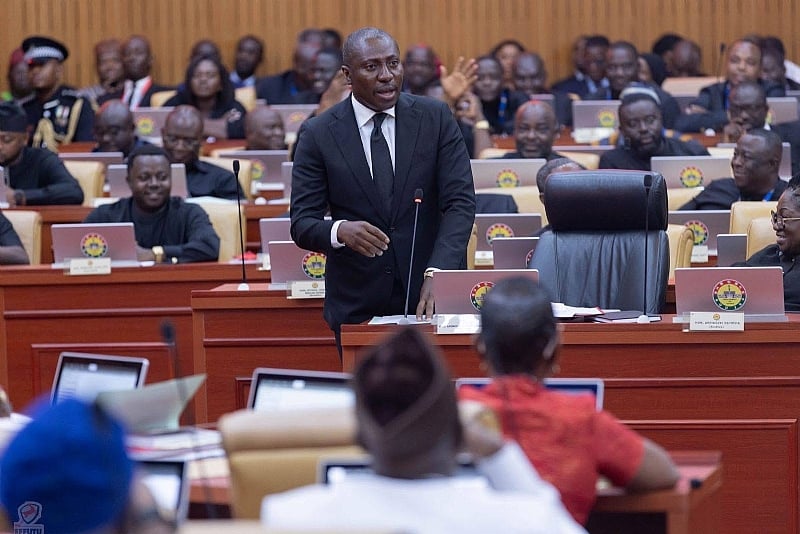The political atmosphere in Ghana has become increasingly charged following a series of events perceived by the opposition New Patriotic Party (NPP) as targeted harassment and persecution. The focal point of this contention is the recent attempted arrest of Assin South MP, Reverend John Ntim Fordjour, by the National Investigative Bureau (NIB). The NIB’s action stemmed from allegations linking two flights, Air Med Flight N823AM and Cavok Air Antonov 12B, to the transport of cocaine and illicit cash. This incident has ignited a firestorm of accusations and counter-accusations, with the NPP crying foul and the government denying any malicious intent. The NPP, led by Minority Leader Alexander Afenyo-Markin, views the attempted arrest of MP Fordjour as part of a broader pattern of intimidation aimed at silencing dissent and undermining the opposition.
Afenyo-Markin, speaking on Accra-based Joy FM’s Midday News, vehemently denounced what he characterized as a calculated campaign of persecution against NPP members under the guise of accountability. He argued that while the NPP supports the principle of accountability, it rejects the arbitrary and heavy-handed tactics employed by the government. Afenyo-Markin emphasized the importance of due process, asserting that any investigation must adhere to established legal procedures and respect the rights of individuals. He called upon President John Dramani Mahama to intervene and restrain the overzealous security operatives, whom he referred to as “hawks,” from further harassing members of the opposition. The Minority Leader’s statements reflect a growing sense of unease and distrust within the NPP towards the government’s actions.
The attempted arrest of MP Fordjour has become a symbolic representation of the escalating political tensions in Ghana. The NPP perceives the incident as a blatant attempt to intimidate and silence its members, while the government maintains that it is simply pursuing legitimate investigations into potential wrongdoing. This clash of perspectives underscores the deep-seated polarization within the Ghanaian political landscape. The accusations of persecution leveled by the NPP raise concerns about the potential erosion of democratic principles and the suppression of political opposition. The government’s response, however, suggests that it views these accusations as politically motivated attempts to undermine its authority and deflect attention from legitimate investigations.
The government, through Presidential Spokesperson Felix Kwakye Ofosu, has categorically denied the allegations surrounding the two flights. Ofosu dismissed claims of cocaine and illicit cash being transported, asserting that the allegations are unfounded and lack any credible evidence. He maintained that the government is committed to upholding the rule of law and ensuring accountability, but stressed that this commitment should not be misconstrued as persecution of political opponents. The government’s denial, however, has done little to assuage the concerns of the NPP, which remains skeptical of the government’s motives and intentions.
The clash between the NPP and the government over the attempted arrest of MP Fordjour highlights the fragile state of political discourse in Ghana. The accusations of persecution, coupled with the government’s denials, have created a climate of mistrust and suspicion. This atmosphere of animosity and polarization threatens to undermine the stability and progress of the country. The need for dialogue, compromise, and respect for due process has become increasingly critical to prevent further escalation of tensions and ensure that the principles of democracy are upheld. The future of Ghana’s political landscape hinges on the ability of both the ruling party and the opposition to engage in constructive dialogue and find common ground.
Moving forward, it is imperative that both the government and the opposition prioritize national unity and stability over partisan politics. The accusations of persecution should be thoroughly investigated, and if any wrongdoing is found, those responsible must be held accountable. Equally important, however, is the need to ensure that legitimate investigations are not used as a pretext to harass or intimidate political opponents. A commitment to transparency, due process, and respect for the rule of law is essential to restoring trust and confidence in the political system. The pursuit of justice and accountability must be balanced with the protection of fundamental rights and freedoms to ensure a fair and equitable political environment for all.














